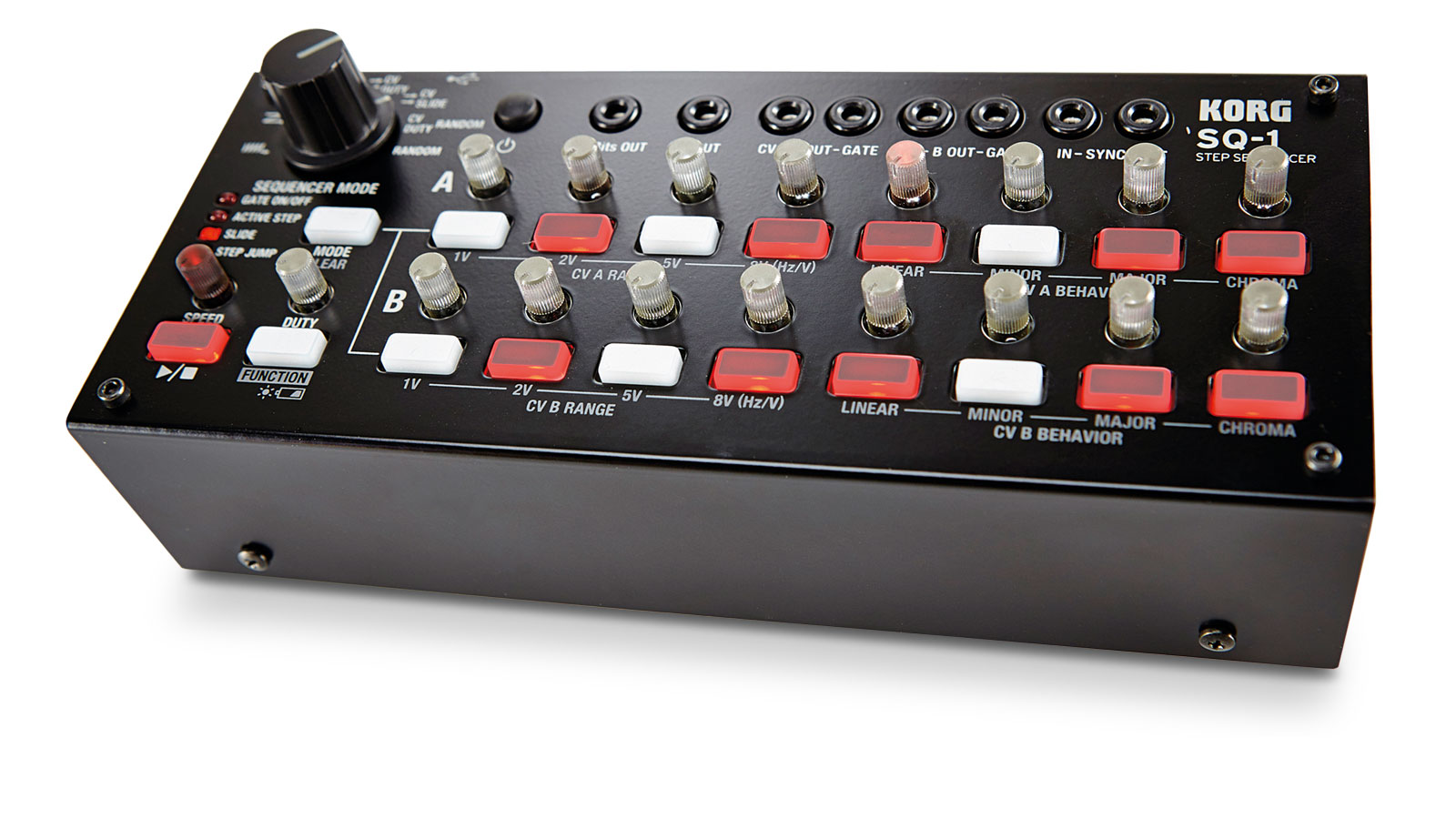MusicRadar Verdict
Plenty of functionality in a compact, cheap and portable battery-powered package.
Pros
- +
Very compact and easy to use with battery power. Cheap to buy, yet very well built. Packed full of facilities for controlling CV/Gate and MIDI gear.
Cons
- -
Screwdriver required for battery access.
MusicRadar's got your back
Sequencers are all the rage again and surprisingly Korg hasn't made a dedicated sequencer for a long time. In fact, the last sequencer it made that anyone got excited about (Electribes aside) was the SQ-10 in 1978, so it's great that it's back in the game!
The SQ-1 is a cute little unit and coming in at £106 (street price around £79) it offers a lot of bang-for-buck. You'll be glad to know it's actually built like a tank with a fully metal case and chassis, a solid MS-20-style mode selector knob and 16 Volca-style translucent backlit knobs with red backlit rubber sequence step/function buttons.
Underneath is the battery compartment where two AA batteries reside, though it's a shame this is held down with two screws rather than having a more easy access opening tab.
"All things considered, the SQ-1's power really impresses for the money"
The SQ-1 can also be powered via its USB port (DAW/USB buss power) or via a USB power adaptor. Interface-wise, the SQ-1 is simple on the surface so as not to get in the way of performing/ programming but there's a lot of functionality provided.
On the front you have two independent sequence rows (Channel A and B), each with eight sequence buttons. These rows can run alternately (per step), in parallel (forwards), in parallel (forward then reverse) A then B (up to 16 steps), in random mode, with CV outputting on A and slides on B, with CV outputting on A and Duty (note length) on B and finally with random CV on A and Duty on B.
You can also set the CV output voltages (1V, 2V, 5V V/Oct or 8V Hz/V options) for interfacing with different equipment by holding function and specific step buttons, so even more eclectic CV/Gate gear is accommodated.
Further to this, the SQ-1 works as a MIDI>CV converter. You can send MIDI notes from your DAW to the USB input on the SQ-1 which then converts the incoming MIDI to CV/Gate data to send to whatever equipment you like. The beauty here is you can address two connected instruments independently (or the two oscs separately on the MS-20M for example).
Want all the hottest music and gear news, reviews, deals, features and more, direct to your inbox? Sign up here.
The timing under MIDI clock is also tight and it's great fun controlling DAW software instruments from the SQ-1 too. Note that when first powering on the SQ-1 you might think that the speed control doesn't go fast enough but, under the global settings, you can set the resolution of each step globally to quarter, eighth or sixteenth notes.
The ins and outs of it
Connection wise there's also plenty to work with. There's a connection for interfacing with Little Bits modular gear, MIDI out (via a mini jack to DIN breakout cable), CV/Gate outs for each channel and Sync in and out for interfacing with Volcas/Monotribes - and all outs work simultaneously.
In use, it's all very intuitive when programming and, when playing back sequences, there are plenty of lights for keeping track of active steps and levels in dimly lit environments.
Also the performance controls taken from the Volca range are a godsend for spicing up sequences and live shows, so you can use Step Jump to instantly trigger steps manually, Active Step to change the length of sequences, Gate on/off to add/remove steps and Slide mode for smooth transitions between notes and 303-style workouts.
You don't even have to worry about being able to program well as, if you want, you can let the SQ-1 harmonically quantise the pitches of each knob/step to the nearest chromatic note or to major/minor scales.
All things considered, the SQ-1's power really impresses for the money, though it misses swing and song mode, plus there's no apparent way to transpose or store favourite sequences currently (all software updateable hopefully).
At least for now you can use Korg's SyncKontrol IOS app for swing and, missing features aside, it's a capable little sequencer that's well-built and won't break the bank.
